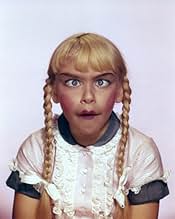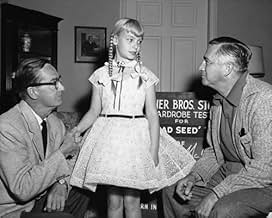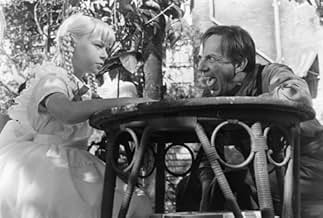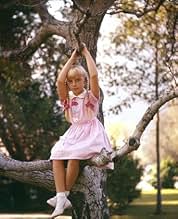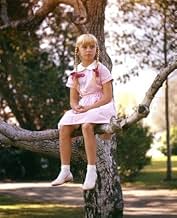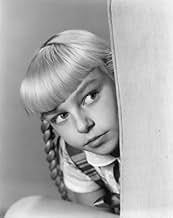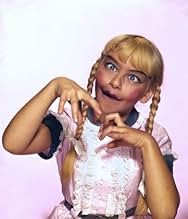CALIFICACIÓN DE IMDb
7.4/10
17 k
TU CALIFICACIÓN
Una ama de casa sospecha que su hija de ocho años, aparentemente perfecta, es una asesina despiadada.Una ama de casa sospecha que su hija de ocho años, aparentemente perfecta, es una asesina despiadada.Una ama de casa sospecha que su hija de ocho años, aparentemente perfecta, es una asesina despiadada.
- Dirección
- Guionistas
- Elenco
- Nominado a 4 premios Óscar
- 1 premio ganado y 6 nominaciones en total
Joan Croydon
- Miss Fern
- (as Joan Croyden)
Frances Bavier
- Woman in Dinner Party
- (sin créditos)
Violet N. Cane
- Teacher
- (sin créditos)
Vivian Clermont
- Mary Beth Musgrove
- (sin créditos)
Shelley Fabares
- Margie
- (sin créditos)
Kathy Garver
- Rhoda's Classmate
- (sin créditos)
Don C. Harvey
- Guard in Hospital Corridor
- (sin créditos)
Edna Holland
- Saleslady
- (sin créditos)
- Dirección
- Guionistas
- Todo el elenco y el equipo
- Producción, taquilla y más en IMDbPro
Opiniones destacadas
I consider this to be more of a psychological drama than a horror movie. Eight-year-old Rhoda has no remorse or feeling for the crimes she has committed, saying that it was "their faults". McCormack is a wonderful actress who could past her age in any movie. Overall, this is my favorite movie of all time and I recommend it to anyone who likes suspense with psychology.
I love this movie. I have read many reviews from professionals and they all seem to think the movie is too theatrical and you can tell it was a stage play and that the mother is especially dramatic. She is, that's true, but in the same way Faye Dunaway chews up Mommie Dearest and we all know what a hoot that is. Little Rhoda is a real stinker. The handyman had better "give her those shoes." The subplot of the mother's own identity is fun too. All in all, the movie is very 50s. You can almost see Wally and the Beaver coming down the street. Great! There is also some discussion about the formal introduction of the cast at the end which I've always found a very nice touch. Much older films of the 30s used to do that all the time. It's been said this film did it to show the characters were just flesh and blood actors and so their roles and the subject matter (especially Patty McCormack) shouldn't be taken seriously. See it. By the way, there is one review on this site by someone who says they saw the movie at age 12 that is very negative. Don't believe it!
"Now there's a little ray of sunshine, that one."
An occasionally riveting movie from the 50's about a sunny, charming, sociopathic little girl and her mother's desperate attempts to protect her and hide her nature. The Bad Seed sometimes makes the mistake of focusing too much on the dull adults, but overall, it's a solid movie. Good acting all around, and unlike similar modern movies like Orphan, The Bad Seed gets better as it goes along instead of imploding into an absurd mess. It feels a lot like a play, which is natural due to its evolution from novel to stage-play to film.
I thought The Bad Seed was a sinister (and relatively timeless) gem of the 50's, and I'm sure it was quite controversial in its time. The ending was changed because of the Hays Code, in fact, and feels a bit like a cop-out as a result, but not to the extent of ruining what came before. Check it out if you're interested.
An occasionally riveting movie from the 50's about a sunny, charming, sociopathic little girl and her mother's desperate attempts to protect her and hide her nature. The Bad Seed sometimes makes the mistake of focusing too much on the dull adults, but overall, it's a solid movie. Good acting all around, and unlike similar modern movies like Orphan, The Bad Seed gets better as it goes along instead of imploding into an absurd mess. It feels a lot like a play, which is natural due to its evolution from novel to stage-play to film.
I thought The Bad Seed was a sinister (and relatively timeless) gem of the 50's, and I'm sure it was quite controversial in its time. The ending was changed because of the Hays Code, in fact, and feels a bit like a cop-out as a result, but not to the extent of ruining what came before. Check it out if you're interested.
Rhoda Penmark seems like your average, sweet eight-year-old girl. When her rival at school dies in mysterious circumstances at the school picnic her mother starts to suspect that Rhoda was responsible. However, if she is correct what should she do about it?
An intriguing thriller directed by Mervyn LeRoy (Waterloo Bridge, Little Women, The Wizard of Oz, Mr Roberts, I am a Fugitive from a Chain Gang). Initially not that compelling: things seem to progress in fits and starts. The plot will meander for a while, then something significant happens and makes you think that the film has kicked up a gear only for it to revert to meandering. There's enough interesting stuff happening to keep you watching but there's long stretches where it is quite easy to zone out (and not miss much). These stretches are quite dialogue-filled and dry, making me think I was watching a play rather than a movie.
However, from about the halfway mark the pace does quicken and the last quarter or so is very tense, making for riveting viewing. The ending is great and contains a wonderful, poetic twist.
While the script and direction can be a bit frustrating at times, I can't fault the performances. Ten-year-old Patty McCormack is excellent as Rhoda and Nancy Kelly is great as her mother. However, Eileen Heckart almost steals the show as Mrs Daigle, the dead boy's mother. All three received Oscar nominations.
An intriguing thriller directed by Mervyn LeRoy (Waterloo Bridge, Little Women, The Wizard of Oz, Mr Roberts, I am a Fugitive from a Chain Gang). Initially not that compelling: things seem to progress in fits and starts. The plot will meander for a while, then something significant happens and makes you think that the film has kicked up a gear only for it to revert to meandering. There's enough interesting stuff happening to keep you watching but there's long stretches where it is quite easy to zone out (and not miss much). These stretches are quite dialogue-filled and dry, making me think I was watching a play rather than a movie.
However, from about the halfway mark the pace does quicken and the last quarter or so is very tense, making for riveting viewing. The ending is great and contains a wonderful, poetic twist.
While the script and direction can be a bit frustrating at times, I can't fault the performances. Ten-year-old Patty McCormack is excellent as Rhoda and Nancy Kelly is great as her mother. However, Eileen Heckart almost steals the show as Mrs Daigle, the dead boy's mother. All three received Oscar nominations.
I saw "The Bad Seed" years ago, circa 1970, for the first time, and have seen it periodically over the years. When I first saw the film, as a child, I found the film, expectedly, quite chilling.
I saw it again this afternoon, after not having seen it for about three years, and still find it quite disturbing. Now that we have IMDb, I decided to offer my thoughts. And so, I was shocked to find SO MANY comments about it...more than for any other film that I've reviewed on IMDb to date. If I add anything of unique value, great. If not, I'm happy to share my review anyway.
Certainly, there are flaws, or perhaps only "unique differences", in this film. Primarily, it can very easily be considered a filmed play, as the staging, the dialog, and the entrances and exits of the characters throughout the film seem to be lifted directly from the stage version. Therefore, some may find the film a bit too sterile or unnatural in many ways. However, I think it is this very sterile, staged, stark-from-a-production-standpoint quality that gives the film an even eerier and in some ways far more realistic edge than might be found were it to be produced today for film, with far more slick and sophisticated sets, dialog, camera work, etc. The realism and pronounced disturbing quality of this version stems from the simple story itself, the psychological horror of which could be in some ways obfuscated from a much more sophisticated, big-studio, modern-day production.
As for the subject matter itself, I know that the number of cases, historically, involving child murderers is actually low. Therefore, some critics have argued that to take a relatively rare phenomenon, such as the child murderer, and build a motion picture around it, portraying it in the vein of plausibility, can be misleading and dangerous, giving the impression, especially to younger viewers, that child criminals are more commonplace than you may think. I wholeheartedly reject this notion. The whole purpose of acting is to portray the entire range of the human condition with as much truth as possible, no matter how rare or commonplace certain aspects of human behavior might be. Though child murderers may be few in number, it's an area worthy of as much exploration, in film, as is an ugly, unrealistic alien telling us to "phone home" or the sinking of the Titanic.
Even though this film possesses a definite "campy", staged, and perhaps even "cult" quality, it is chillingly effective. One reason for which this film works is due to the character of Rhoda herself, played by Patty McCormack. The smiling, blond, blue-eyed veneer of the child juxtaposed with the idea of her criminal potential (and actions) is just plain "creepy". Moreover, the less you see, in terms of the actual crimes she commits, the more you conjure. And, you continually wonder who her next victim will be. Furthermore, you wonder how many people will eventually "come on to her" and become aware of whom she is, and how that knowledge will affect their fate.
Another reason for which this film works is because of the mother, Christine, played by Nancy Kelly. As we slowly watch her become aware of what has become of her daughter, we can't help but empathize with her predicament and her decision in handling it. The first few times I saw the film, just as I felt that Patty McCormack's portrayal and dialog delivery were probably mere replicas of what she offered on stage, I felt that Nancy Kelly's performance was affected and probably lifted directly from her work on the stage (I've never seen a stage version, nor have I read the book, yet). But in the case of Ms. Kelly, watching her realize what she has ultimately given birth to and raised is very heart wrenching. Moreover, I have always wondered if the use of her right hand was a direction given to her by either of her directors (for play or film), or if it was something she came up with herself. Two instances come to mind.
In the first one, the manner in which she hits the table with her right hand as she listens to what is happening outside near her shed while Rhoda plays "Au Claire de la Lune" on her piano is very pronounced, appears somewhat odd and is perhaps symbolic. She seemed to be pounding her hand not only in outward denial and anger at the realization she now has of what her child is capable of committing, but as a means to torture and punish herself for having given birth to her in the first place. In the second instance, Nancy Kelly used her right hand again in a very pronounced manner when she offers Rhoda her vitamins "that night". Again, I couldn't help but wonder what symbolism she wanted us to draw from her gesture. It might be said that this very hand, which once comforted and fed her child all her life, has now become the tool that feeds the ultimate fate of her child toward the end of the film. (Again, not having read it, I have a fairly good idea how the book ends).
As for how the ending/epilogue in the film was handled, practically everyone on this site who has offered a review knows that the use of the "casting call" was basically dictated by the mandates of the Hays Code. I'll just add that I find that the chilling effect of the story carries over to this bizarre "epilogue". I still find it a bit unsettling to see each of these actors take their bows, especially considering that some of the characters they portrayed would, in my estimation, appear stranger to a child than does Rhoda....particularly Leroy, when he bows to the viewing audience carrying his large pitchfork.
I saw it again this afternoon, after not having seen it for about three years, and still find it quite disturbing. Now that we have IMDb, I decided to offer my thoughts. And so, I was shocked to find SO MANY comments about it...more than for any other film that I've reviewed on IMDb to date. If I add anything of unique value, great. If not, I'm happy to share my review anyway.
Certainly, there are flaws, or perhaps only "unique differences", in this film. Primarily, it can very easily be considered a filmed play, as the staging, the dialog, and the entrances and exits of the characters throughout the film seem to be lifted directly from the stage version. Therefore, some may find the film a bit too sterile or unnatural in many ways. However, I think it is this very sterile, staged, stark-from-a-production-standpoint quality that gives the film an even eerier and in some ways far more realistic edge than might be found were it to be produced today for film, with far more slick and sophisticated sets, dialog, camera work, etc. The realism and pronounced disturbing quality of this version stems from the simple story itself, the psychological horror of which could be in some ways obfuscated from a much more sophisticated, big-studio, modern-day production.
As for the subject matter itself, I know that the number of cases, historically, involving child murderers is actually low. Therefore, some critics have argued that to take a relatively rare phenomenon, such as the child murderer, and build a motion picture around it, portraying it in the vein of plausibility, can be misleading and dangerous, giving the impression, especially to younger viewers, that child criminals are more commonplace than you may think. I wholeheartedly reject this notion. The whole purpose of acting is to portray the entire range of the human condition with as much truth as possible, no matter how rare or commonplace certain aspects of human behavior might be. Though child murderers may be few in number, it's an area worthy of as much exploration, in film, as is an ugly, unrealistic alien telling us to "phone home" or the sinking of the Titanic.
Even though this film possesses a definite "campy", staged, and perhaps even "cult" quality, it is chillingly effective. One reason for which this film works is due to the character of Rhoda herself, played by Patty McCormack. The smiling, blond, blue-eyed veneer of the child juxtaposed with the idea of her criminal potential (and actions) is just plain "creepy". Moreover, the less you see, in terms of the actual crimes she commits, the more you conjure. And, you continually wonder who her next victim will be. Furthermore, you wonder how many people will eventually "come on to her" and become aware of whom she is, and how that knowledge will affect their fate.
Another reason for which this film works is because of the mother, Christine, played by Nancy Kelly. As we slowly watch her become aware of what has become of her daughter, we can't help but empathize with her predicament and her decision in handling it. The first few times I saw the film, just as I felt that Patty McCormack's portrayal and dialog delivery were probably mere replicas of what she offered on stage, I felt that Nancy Kelly's performance was affected and probably lifted directly from her work on the stage (I've never seen a stage version, nor have I read the book, yet). But in the case of Ms. Kelly, watching her realize what she has ultimately given birth to and raised is very heart wrenching. Moreover, I have always wondered if the use of her right hand was a direction given to her by either of her directors (for play or film), or if it was something she came up with herself. Two instances come to mind.
In the first one, the manner in which she hits the table with her right hand as she listens to what is happening outside near her shed while Rhoda plays "Au Claire de la Lune" on her piano is very pronounced, appears somewhat odd and is perhaps symbolic. She seemed to be pounding her hand not only in outward denial and anger at the realization she now has of what her child is capable of committing, but as a means to torture and punish herself for having given birth to her in the first place. In the second instance, Nancy Kelly used her right hand again in a very pronounced manner when she offers Rhoda her vitamins "that night". Again, I couldn't help but wonder what symbolism she wanted us to draw from her gesture. It might be said that this very hand, which once comforted and fed her child all her life, has now become the tool that feeds the ultimate fate of her child toward the end of the film. (Again, not having read it, I have a fairly good idea how the book ends).
As for how the ending/epilogue in the film was handled, practically everyone on this site who has offered a review knows that the use of the "casting call" was basically dictated by the mandates of the Hays Code. I'll just add that I find that the chilling effect of the story carries over to this bizarre "epilogue". I still find it a bit unsettling to see each of these actors take their bows, especially considering that some of the characters they portrayed would, in my estimation, appear stranger to a child than does Rhoda....particularly Leroy, when he bows to the viewing audience carrying his large pitchfork.
¿Sabías que…?
- TriviaThe original Broadway production of "The Bad Seed" by Maxwell Anderson opened on December 8, 1954 and ran for 334 performances. Nancy Kelly won the 1955 Tony Award for Actress in a Drama and recreated her part in the movie. Patty McCormack, Eileen Heckart, Evelyn Varden, Henry Jones and Joan Croydon also recreated their stage roles in the movie version.
- ErroresWhen Christine scolds Rhoda for asking for a garnet as well as a turquoise, the reflection of someone, probably Mervyn LeRoy, sitting in a chair with his legs crossed is visible in the coffee pot. Addition: Just to the left of the reflection that is assumed to be LeRoy you can see other crew members moving in the shadow of the door frame reflected in the coffee pot.
- Créditos curiososAfter the finale, a narrator tells the audience "One moment please. And now our wonderful cast." Then, the principal cast members are introduced one by one, like they would be at the end of a play. After that's done with, there's a brief scene in which Nancy Kelly spanks Patty McCormack.
- ConexionesFeatured in Obsesión fatal (1986)
- Bandas sonorasAu clair de la lune
(uncredited)
Attributed to Jean-Baptiste Lully
Played on the piano by Patty McCormack and whistled by Henry Jones
Played often in the score
Selecciones populares
Inicia sesión para calificar y agrega a la lista de videos para obtener recomendaciones personalizadas
Detalles
- Fecha de lanzamiento
- País de origen
- Idioma
- También se conoce como
- The Bad Seed
- Locaciones de filmación
- Midwest Street, Warner Brothers Burbank Studios - 4000 Warner Boulevard, Burbank, California, Estados Unidos(as Tidewater Arms Apartments exteriors)
- Productora
- Ver más créditos de la compañía en IMDbPro
Taquilla
- Presupuesto
- USD 1,000,000 (estimado)
- Tiempo de ejecución2 horas 9 minutos
- Color
- Relación de aspecto
- 1.85 : 1
Contribuir a esta página
Sugiere una edición o agrega el contenido que falta

Principales brechas de datos
By what name was La mala semilla (1956) officially released in India in English?
Responda

